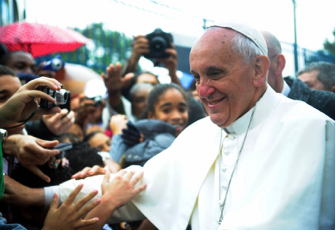‘I WAS IN PRISON AND YOU CAME TO ME’ POPE FRANCIS’S CHALLENGE TO AMERICA
This article, written by CCFY’s Executive Director Rev. Rubén Austria first appeared in the September 22nd issue of “Urban Matters” published by the Center for New York City Affairs
During Pope Francis’s visit to the United States this week, criminal justice reform will take center stage. In addition to stops at the White House, Capitol Hill, the United Nations, and St. Patrick’s Cathedral, on Sunday at 11:00, he will visit men who are incarcerated at the Curran-Fromhold Correctional Facility in Philadelphia.
Many are eager to hear what Pope Francis will say about criminal justice reform. The U.S. leads the world in imprisoning people; we detain a quarter of the world’s prisoners though we account for only five percent of the world’s population. The impacts of our punitive policies are felt most heavily in communities of color, where one out of every six Latino boys and one out of every three African-American boys will be incarcerated in their lifetimes, if current trends continue. Along with other advocates for reform, I am hoping that Pope Francis calls us to repent of our national addiction to incarceration.
While we eagerly await the Pope’s words, he has already spoken volumes by his actions. In 2013, 10 days after his election to the papacy, he celebrated Holy Thursday Mass at a juvenile detention center in Rome, where he washed the feet of 12 young people incarcerated there. This past Easter, he repeated this act with adult prisoners. Doing so, he has instructed us how we should treat people in prison.
The foot-washing ceremony is a tradition dating back to the Last Supper when Jesus washed the feet of his disciples. The act was as scandalous then as it is now, with his disciples shocked and offended that the one they called Lord and Teacher would stoop to such a lowly position. Yet Jesus insisted that this act of humility and service was necessary and instructed them to go and do likewise.
By washing the feet of people in prison, Pope Francis elevates the discourse on criminal justice reform. To visit people in prison, to eat with them, pray with them, touch them, and serve them is to radically affirm our shared humanity with the incarcerated. It inspires us to see them not as “inmates,” “felons,” or “convicts,” but as fellow human beings made in the image of God. By his acts, the Pope is calling us to recognize the humanity of people in the criminal justice system.
By washing the feet of prisoners, Pope Francis also inverts traditional power dynamics. So often our approach to people in prison is punitive or paternalistic, performed from a place of perceived superiority. When the world’s most influential religious leader kneels at the feet of a person in prison, he affirms the leadership role of people impacted by the justice system.
When Jesus washed his disciples’ feet and instructed them to do so to others, he commissioned them to be agents of healing and restoration in the world. What would it look like if we centered the discussion of criminal justice reform not on the pronouncements of pundits or the proclamations of policy experts, but on the wisdom of those who have been directly impacted by the system? Across the country, men and women who have been touched by the justice system are leading a movement to repair the damage done by incarceration. These “credible messengers” are mentoring young people, supporting family members, speaking out against injustice and developing policy solutions. We need to recognize their leadership role in the work of building a post-incarceration society.
Pope Francis scandalized some in the Catholic Church by washing the feet of people historically excluded by church tradition. In the juvenile detention center, he washed the feet of a young Muslim woman, breaking canonical law that limits the practice to male followers of Christ. Pope Francis has also shared meals with gay and transgendered prisoners. In these ways, the Pope is again teaching without words not to divide people in prison into categories that make us feel comfortable. So much of the current discussion on criminal justice reform stays in safe territory, focusing on low-level, non-violent drug offenders, while excluding those with labels like “violent offender” or “repeat felon.” Pope Francis’s actions demonstrate that mercy, grace, and redemption go beyond such limitations.
I am eager to hear what Pope Francis has to say about criminal justice reform. But his actions have already challenged us to embrace a radically different paradigm of how we approach people in prison. I am praying that we follow his example.
Rev. Rubén Austria is the executive director of Community Connections for Youth, a Bronx-based non-profit organization whose mission is to empower grassroots faith and neighborhood organizations to develop effective community-driven alternatives to incarceration for youth.
For original post go to: http://www.centernyc.org/urbanmatters/2015/9/22/i-was-in-prison-and-you-came-to-me


